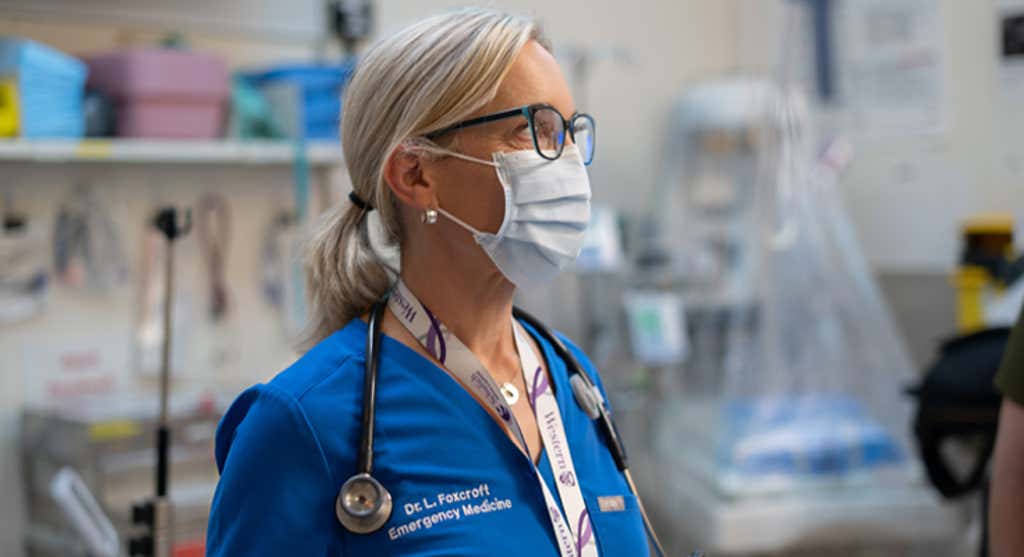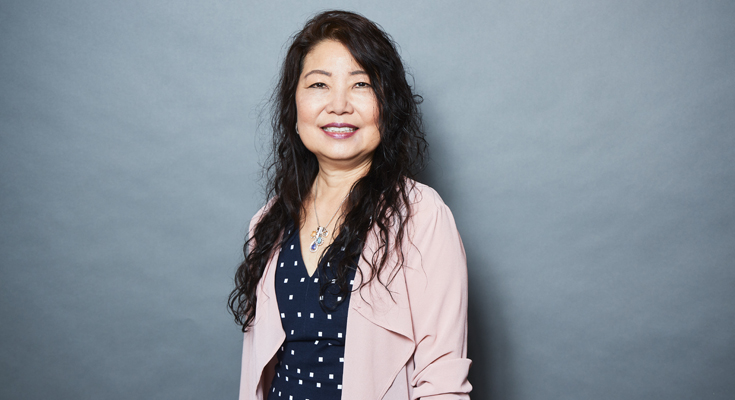
DR. LAURA FOXCROFT, a London emergency department physician (photo credit: Mac Lai)
Accessing emotional support in times of crisis
Imagine arriving at your office or for your Emergency Department shift every day within a system that had all of the resources needed to seamlessly investigate, manage and refer your patients for all their care needs.
“That scenario,” says Dr. Laura Foxcroft, a London emergency department physician, “is a key contributor of wellbeing for a physician practising in Ontario today.”
That such a vision is so unbearably distant from the reality of practising in Ontario is the reason Dr. Foxcroft has a second job — running a support program that provides one-on-one peer support for clinical faculty who wish to discuss the concerns and frustrations they are facing.
The Peers for Peers Program, created for faculty at Western University’s Schulich School of Medicine and Dentistry, was the first of its kind at an academic centre. The strong demand for an empathetic ear became quickly apparent after the program’s launch in March 2020. At the time of its introduction, 17 leads from every clinical department across the faculty were recruited as wellbeing leads. Three years later, the number of wellbeing leads has more than tripled and more than 300 encounters have occurred.
Dr. Andrea Lum, the Vice Dean, Clinical Faculty Affairs at Western, says it was apparent to her, in early 2020, that the school needed to better explore and understand the emotional distress faced by physicians, whether job-related or in their personal lives. When the pandemic was declared in March 2020, it was the catalyst needed to fast-track plans to implement the peer support program, moving from concept to fruition in just four weeks, to better support clinical faculty.

DR. ANDREA LUM, Vice Dean, Clinical Faculty Affairs at Western (photo credit: Arash Moallemi)
The concept of peer-to-peer support recognizes that it is important for professionals to be able to access the emotional support they need, but at a distance from leaders, says Dr. Lum, who also sits on CPSO's Board as an academic director. “You are able to talk to people who are walking in the same shoes as you are. They know exactly what you are dealing with, what you are up against every day.”
She also points out that as contractors — not hospital employees — doctors often aren’t included in many organizational, hospital-based support networks, resources or employee assistance programs. They are often left to fend for themselves, feeling detached and alone.
“You are able to talk to people who are walking in the same shoes as you are. They know exactly what you are dealing with, what you are up against every day”
Drs. Lum and Foxcroft have likened the program to roadside assistance. It is a quick intervention that allows clinical faculty members in challenging situations to conveniently access the support they need and, if necessary, be guided to more intensive resources.
“Physicians are hesitant to go through the front doors of an emergency department when they feel suicidal or in distress,” says Dr. Foxcroft. “And our peer support program has been able to find resources for physicians so they can still get the acute care they require, but in a psychologically safe way.”
In addition to the quick access it provides, the program is an important part of medicine’s culture change, signalling to physicians that acknowledging vulnerability is not a weakness, but a strength.
Both Drs. Lum and Foxcroft, however, say the program can’t be relied upon as a long-term solution and other more sustaining measures are needed.
Occupational Stress Injury
In her years as an emergency physician and through her work with Peers for Peers, Dr. Foxcroft has a strong sense of the breadth and depth of the moral distress impacting Ontario physicians. She shares the all-too-common example of a patient diagnosed with cancer, who makes the excruciatingly slow journey through the continuum of care. At every step of a path filled with postponed surgeries and delayed procedures, it becomes evident to everyone involved in their care that system failures are causing the patient unnecessary stress during an already difficult time.
“These highly skilled people know what resources they need. They know what the expected guidelines are and what the evidence is to provide the care, but they can't actually do the job that they've been trained to do in the time that they've been trained to do it. And when the outcome is bad, they wear that. They feel that,” says Dr. Foxcroft. “Then on top of that moral distress, they're dealing with increased litigation because patients and families are not receiving the standard of care expected in a first-world country.”
The term “burnout” is often used to describe the disengagement caused by repeat exposure to morally distressing events. But Dr. Foxcroft prefers the term “operational stress injury,” a term borrowed from the military experience to describe the persistent psychological difficulty directly resulting from their service. The term, she says, accurately locates the source of dysfunction within the system — and not within the individual.
"[The term] really focuses on the fact that evidence and data show that it's the system that is burning out and impacting our physicians in such a negative way,” she says.
Dr. Foxcroft says she wants the lessons learned in managing veterans’ trauma to be applied to physician mental health. “I think there are so many parallels and synergies to the experience of veterans and physicians,” she says. If she had her wish, she’d create an operational stress injury clinic for physicians, built along the lines of the ones available to veterans and law enforcement officers. "A place where unwell physicians can be brought to a place of wellbeing and where they can then enter a healthier workplace environment. That's really what is needed nationally for physicians."
Dr. J Don Richardson, a colleague of Dr. Foxcroft’s and a psychiatrist who has spent his career working with military veterans suffering trauma, agrees. In fact, when he was involved in a study examining the effects of the pandemic on veterans, many of the study participants mentioned how worried they were about the mental health of their own physicians.
Like Dr. Foxcroft, he believes terminology is important. He rejects terms that suggest physicians lack resilience or are simply stressed out. "Most physicians thrive on stress. Otherwise, we would not have become physicians,” he says. “It’s not stress that's causing burnout or moral distress in physicians — its organizational challenges.”
Dr. Richardson sees parallels in the moral distress suffered by physicians who are challenged by knowing what care patients need but are unable to provide it due to constraints beyond one’s control, and the experience of peacekeepers who witness atrocities and are unable to intervene because of rules of engagement.
“It’s not stress that's causing burnout or moral distress in physicians — its organizational challenges.”
Both groups, he says, suffer moral distress every time they feel they have participated in actions that transgress their moral beliefs or feel betrayed by an authority figure in a high-stakes situation, preventing them from doing the right thing. When that instinct to intervene is thwarted repeatedly, the moral distress caused by such institutional betrayal accumulates into moral injury, says Dr. Richardson.
The path to solutions, he says, lies in encouraging more and better engagement — something in very short supply in health care. Organizations and government need to acknowledge the clinician experience and understand how their decisions impact those providing front line care. For their part, physicians need to come together with other health care professionals and speak as one voice to demand what they need to provide quality patient care.
Drs. Foxcroft and Lum believe the Peers for Peers Program has been a critical part of this path forward, removing the barriers that have long prevented physicians from reaching out to each other about the issues that pain them. “Physicians feel less alone because they feel more supported by peers. That is an important part of the recovery,” says Dr. Foxcroft.
DEFINING THE TERMS
- Operational Stress Injury (OSI):
A term that was created by a Canadian, Lieut. Col. (retd) Stephane Grenier. It refers to any persistent psychological difficulty resulting from operational duties such as law enforcement, combat or any other service-related duties. With the recognition that other professions may experience similar occupational injuries, over the years, the term OSI has expanded to include what we would generally consider as "occupational” stress injuries. - Moral Injury and Moral Distress:
These terms refer to the psychological, social, and spiritual harm that results from events or acts that a person performs, witnesses, or fails to prevent, which conflict with one’s own deeply held moral beliefs and values. While both terms exist on a spectrum, they differ in the severity of impairment and harm that they represent. Moral injury represents a more severe and often debilitating impairment, whereas moral distress tends to be less extreme but still emotionally taxing.












